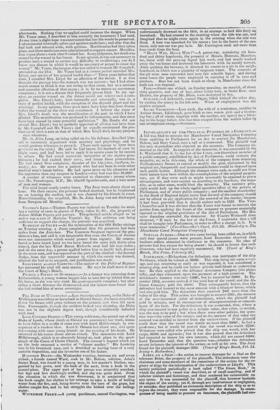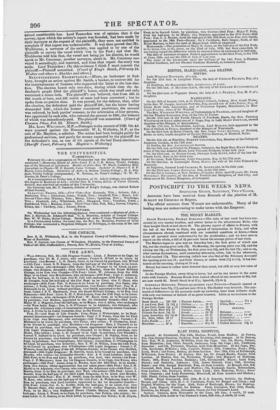INVIOLABILITY OF TIIE ORIGINAL PURPOSES OF A COMPANY:
A bill was filed to restrain the Manchester Canal Navigation Company from applvine. to Parliament for an Act to convert the Maechester, Bolton and Bury Canal, into a rail or a tram-road. The plaintiff was the only shareholder who objected to the measure. The Company de- murred to the bill. In support of the demurrer, it was contended by Sir C. Wetherell that if, by the law of the Court, one dissentient member of a public company, established by Act of Parliament, could restrain the majority, or, as in this case, the whole of the company from obtaining Parliamentary licence to extend or modify the plan' authorized by the original act, insuperable and unreasonable fetters would be imposed upon suds public bodies. Although the changes were such, as could not from their nature base been within the contemplation of the original proprie- tors, yet if they were such as might reasonably be expected to prove advantageous, and were carried on according to the bye-laws, the majo- rity, as in other cases would bind the minority. The contrary prin- ciple would lock up the whole world operative effect of the powers of Parliament, and of every public company; and the smallest shareholder in the Bank of England might insist that the seal of the company should not be affixed to any application for the renewal of the charter, because it had been provided that it should endure only to 1832. The Vice- Chancellor said it was obvious that the Court was bound to restrain the parties from applying the funds of the company to purposes essentially opposed to the original provisions of the Act of Parliament. His Ho- nour therefore overruled the demurrer. Sir Charles Wetherell then observed, " If such be the law of the Court, I undertake that a bill such be brought into Parliament, in order to effect a change in it. It is most intolerable." (Vice-Chancellor's Court, Feb. 23. Maudesley v. The
Manchester Canal Navigation Company.) •
SPECIAL JUROns.—One or two cases having been called on, in which only four special jurors were present, Lord Tenterden observed that bankers seldom attended in obedience to the summons. No class of persons had less excuse for being absent ; he should in future fine such absentees, who had been regularly summoned, 10/. (Court of King's Bench, Nisi Prins, February 23.) INSURANCE.—Richardson, the defendant, was mortgagee of the ship Swiftsure, which he valued at 30001. This ship being out upon a voy- age, and not returning as early as was expected, it was considered a missing ship, and he could not induce private individuals to underwrite her. He then applied to the Alliance Assurance Company (the plain. tiffs), and they consented, upon the payment of a high premiem. The defendants interest was only 15001., but he insured for 20001. In De- cember 1824, accounts arrived of the total loss of the Vessel, and the Al. liance Company paid the 2000/. They subsequently learnt, that the defendant had insured to the Same amount with a Glasgow house, which had also paid him. The defendant thus received 700/. more than the value of the ship. This action was brought to recover 2801., the amount of the over-insurance (after all deduetions), which the plaintiff had paid by mistake, and in consequence of misrepresentation or conceal- ment of the facts. For the defendant, it was contended, that, where a ship was insured in one policy at a certain value, that value, as settled, was the sum to be paid ; but when there were other policies, the ques- tion was—the valise of the subject, and to the amount of that value the assured was entitled to recover from the underwriters. If the plaintiff could show that the vessel was worth no more than 30001., he had a good case; but it would be proved that the vessel was worth 37001. Witnesses were called who proved that the ship was worth, with her cargo, 3000/. and upwards ; but it was also proved that the defendant had intended to insure his own interest, which did not exceed -16004 Lord Tenterden said, that the question was—whether the defendant meant to insure the interest of the owner, RS well as his own. The Jury found for the plaintiff, damages 2801. (Court of King's Bench, Feb. 24. Irving v. Richardson.) LIBEL ON A Snir.—An action to recover damages for a libel on the schooner Delos, the property of the plaintiffs. The defendants were the chairman and some members of the committee of the society for the re- gistry of ships for the information of the underwriters at Lloyd's. This society published periodically a book called "The Green Book," in which the plaintiff's vessel was described, as of small scantling, and of inferior timbers and fastenings, and thus rendered her uninsurable On - any terms. It was contended for the -plaintiff, that however laudable the object-of the society, yet if, through any inadvertence or negligence, or mistake, they published an erroneous description of the ship so as to injure the owners, they were responsible for the damage. In come. quenetrof being unable to procure an insurance, the plaintiffs had sus. tained considerable loss. Lord Tenterded was of opinion that if the survey, upon which the society's report was founded, had been made by their surveyor at the request of the plaintiffs, they were not entitled to cOmplain if that report was unfavourable. It was then proved that Mr. TItchborne, a surveyor of the society, was applied to by one of the plaintiffs to survey the vessel which was in the Pool ; and that Mr. Titchbome told him that, the vessel not being Lin his district, he .would speak to Mr. Courtney, another surveyor, about it. Mr. Courtney sur- veyed it accordingly, and reported, and from that report the entry was made. Lord Tenterden : On this evidence I think I must nonsuit the plaintiff.-Plaintiff nonsnited. (Court of King's Bench, February 24. Walker and others v. Shadden and others.) ELECTIONEERING EXORBITANCE.-Hines, an innkeeper at Sud- bury, brought an action against Mr. Smith, a banker, to recover 501. for the entertainment of freemen who supported the latter at the late elec- tion. The election lasted only two days, during which time the de- fendant's people filled the plaintiff's house, which was small and only contained a dozen beds. The plaintiff's son believed, that from 50/. to GOl. worth of beer, and 50/. worth of meat had been consumed ; but he spoke from no precise data. It was proved, for the defence, that, after the election, the defendant paid the plaintiff 50/., but the latter having demanded 150/., which the former considered exorbitant, the account was referred, by both parties' consent, to the arbitration of four persons, two appointed by each side, who reduced the amount to 1004 the balance of which was immediately paid. The plaintiff was nonsuited. (Court of Common Pleas, Feb. 23. Hines v. Smith.) MR. LONG WELLESLEY, M.P.-Damages to the amount of 212/. 12s. 4d. were assessed against the Honourable W. L. Wellesley, M.P., at the suit of Mr. Mayhew, a solicitor. The action had been brought partly for professional services, and partly for money expended by the plaintiff for the defendant's use, as one of his agents at the late Essex election.- (Sheriff? Court, February 19. Mayhew v. Wellesley.)



























 Previous page
Previous page